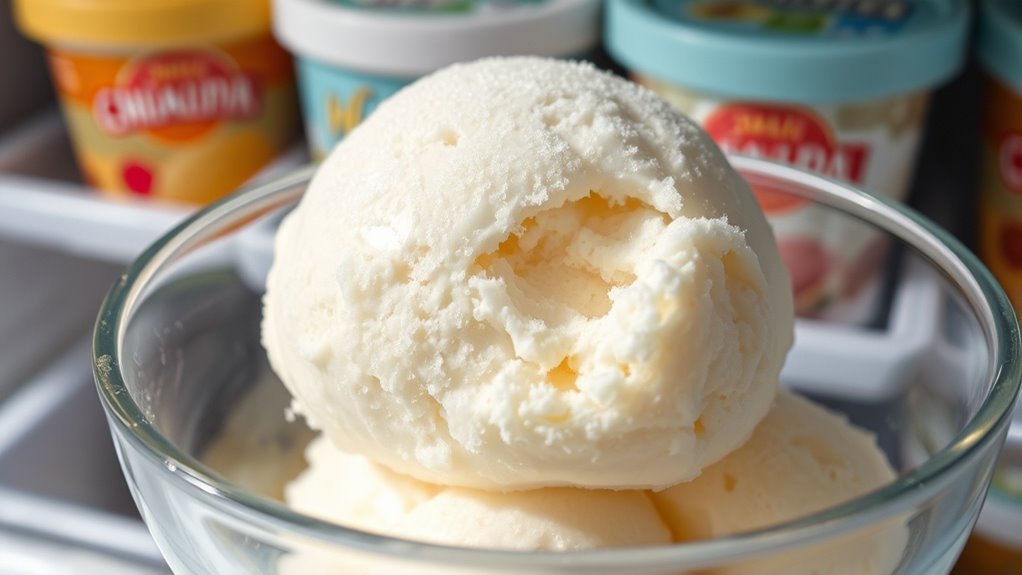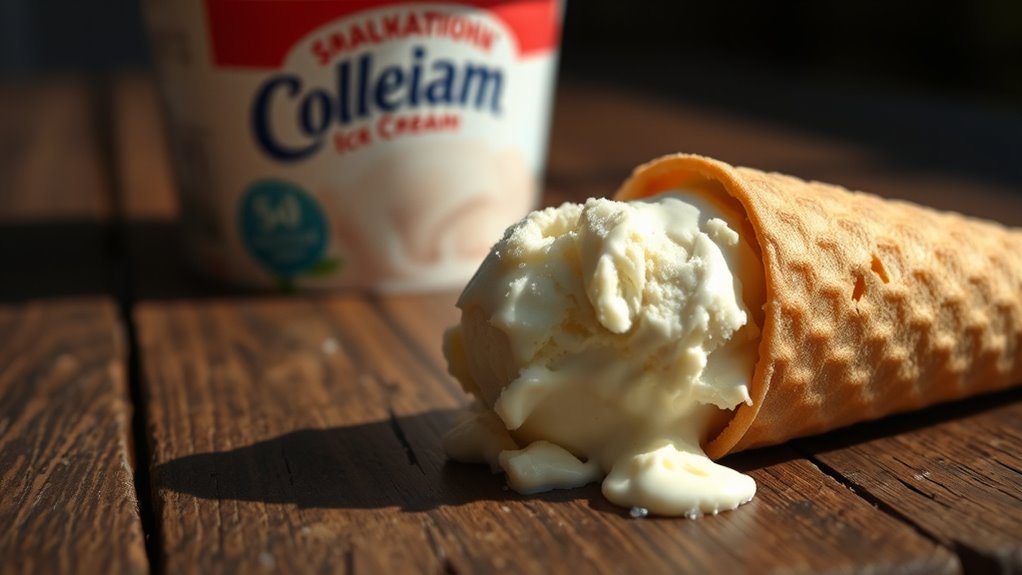Yes, ice cream does expire, but proper storage can extend its shelf life. Typically, unopened ice cream lasts 2 to 4 months in the freezer, while opened containers should be enjoyed within 1 to 2 months. Signs it’s past its prime include ice crystals, freezer burn, off-odor, or changes in texture and flavor. If you’re curious about how to keep it fresh longer or spot spoilage, there’s more to know to keep your ice cream safe and delicious.
Key Takeaways
- Unopened ice cream typically lasts 2 to 4 months in the freezer for optimal quality.
- Once opened, it should be consumed within 1 to 2 months to prevent flavor and texture deterioration.
- Signs of spoilage include ice crystals, freezer burn, off-odor, discoloration, or sour/rancid smell.
- Proper storage in airtight containers at 0°F (-18°C) helps extend shelf life and maintains freshness.
- When in doubt about the ice cream’s safety or quality, it’s best to discard it to avoid foodborne illness.

Have you ever wondered how long your ice cream stays safe to eat? The truth is, knowing the shelf life of ice cream isn’t just about expiration dates stamped on the container. Proper storage plays a big role in maintaining its quality and safety. Following storage guidelines helps prevent freezer burn, spoilage, and the development of off-flavors. When ice cream isn’t stored correctly, it can develop texture issues or flavor changes that make it less enjoyable — or even unsafe to consume. To keep your ice cream fresh for as long as possible, always keep it tightly sealed and stored at a consistent temperature of 0°F (-18°C). Avoid leaving it out at room temperature for extended periods, as this can accelerate spoilage and lead to ice crystal formation, which affects texture and taste. Proper storage practices are essential for maintaining ice cream’s flavor and texture over time.
Over time, even if stored properly, ice cream can undergo flavor changes. These usually happen because of exposure to air, temperature fluctuations, or prolonged storage. When ice cream is repeatedly thawed and refrozen, the texture becomes grainy, and the flavors can become dull or develop off-tastes. This is often a sign that it’s time to toss it, especially if you notice a sour or rancid smell, which indicates spoilage. Generally, unopened ice cream can last about 2 to 4 months in the freezer without significant flavor changes, but this varies depending on the type and how well it’s stored. Once opened, it’s best to consume it within 1 to 2 months to enjoy ideal flavor and texture. Always check for ice crystals, freezer burn, or discoloration, as these signs suggest the ice cream’s quality has diminished.
When it comes to storage guidelines, keep your ice cream in the coldest part of the freezer, not the door, where temperature fluctuations are more common. Use airtight containers or the original packaging to limit exposure to air, which can cause flavor changes and freezer burn. If you notice any ice buildup or if the ice cream develops a soggy or icy texture, it’s a sign that it’s been compromised. While you might be tempted to keep it longer, the safest bet is to trust your senses. If it looks, smells, or tastes off, it’s better to toss it out than risk foodborne illness. Proper storage and attentive observation are your best tools for enjoying ice cream at its peak quality, ensuring each scoop remains a delightful treat.
Frequently Asked Questions
Can Eating Expired Ice Cream Make You Sick?
Eating expired ice cream can potentially make you sick, as it may contain bacteria or mold growth that cause food poisoning. If the ice cream smells sour, has a strange texture, or shows discoloration, avoid eating it. While some mold might be harmless, it’s best to discard ice cream if you’re unsure. Consuming spoiled ice cream increases your risk of stomach upset or more serious foodborne illnesses.
How Can I Tell if Ice Cream Has Gone Bad?
Ever wonder how you can tell if ice cream has gone bad? You should look for visual cues like discoloration, ice crystals, or freezer burn. Smell indicators are also essential—if it smells sour or off, it’s a sign to toss it. Do a quick taste test only if it looks and smells normal. Trust your senses; they’re your best tools for judging ice cream’s freshness.
Does Homemade Ice Cream Last Longer Than Store-Bought?
You might notice that homemade ice cream doesn’t last as long as store-bought because of preservation methods. Store-bought ice cream typically contains stabilizers and preservatives that extend its freshness. Homemade versions, often lacking these additives, need to be consumed faster and stored properly in airtight containers. To maximize shelf life, keep both types at consistent freezing temperatures and avoid frequent thawing. Generally, homemade ice cream lasts about 1-2 weeks, while store-bought can last longer.
Can Freezing Ice Cream for Too Long Harm Its Quality?
You wonder if freezing ice cream too long ruins it. Over time, ice crystal formation can make it gritty, and freezer burn might develop, affecting taste and texture. While it won’t make you sick, prolonged storage diminishes quality. If you notice ice crystals or a dry, frosty surface, it’s a sign to toss it. Keep it properly sealed and consume within a few months for the best experience.
What’s the Best Way to Store Ice Cream to Extend Its Shelf Life?
To extend your ice cream’s shelf life, focus on proper storage tips and freezer organization. Keep it tightly sealed to prevent freezer burn and avoid temperature fluctuations by storing it in the coldest part of your freezer. Use a dedicated container or wrap it well, and keep the lid airtight. Regularly check your freezer’s temperature, and organize it so ice cream stays consistently cold and fresh longer.
Conclusion
Remember, like a fleeting summer sunset, ice cream’s freshness doesn’t last forever. When you notice ice crystals, freezer burn, or off smells, it’s time to say goodbye. Trust your senses—your taste buds and nose are like the wise old guides of the Arctic, warning you to toss out the old and savor the new. Keep it fresh, keep it safe, and enjoy every scoop as if it’s a rare, precious treasure.









